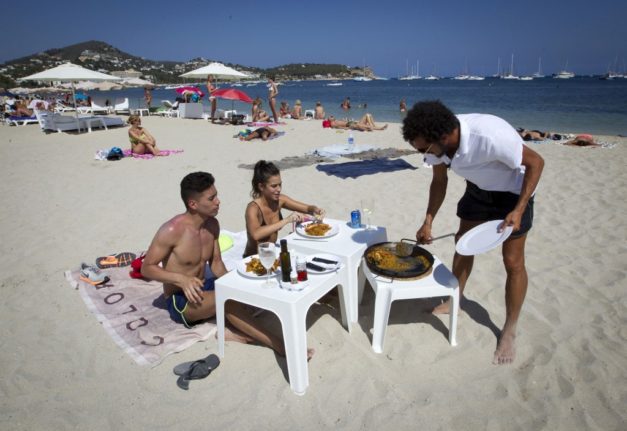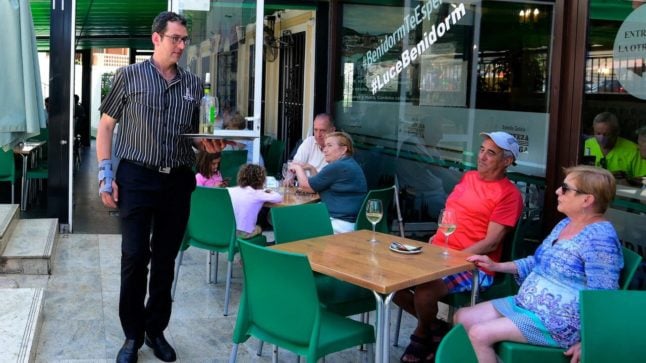“I advertised online… and I’ve asked everywhere, but until now I haven’t had any success,” says González, who runs the Taberna Andaluza in Benidorm, a hub for mass tourism on Spain’s southeastern coast.
At full capacity, his restaurant can seat 120 people, but he is currently two waiters short among a staff of 16, making it “impossible” to open seven days a week.
“My staff need to rest,” he says with a shrug.
Whether it’s chefs, bar staff or dishwashers, many bars, restaurants and cafes across Benidorm are struggling to recruit workers, generating a new source of tension after two years of pandemic.
“It looks like it’s going to be a great summer,” says Alex Fratini, watching tourists sit down on the terrace of his cafe, one of eight establishments he runs in Benidorm.
“But the lack of staff is really problematic.”
“We’ve always had problems finding people, but we’ve never seen it this bad,” he told AFP.
“Two weeks ago, we’d lined up 10 people for interview, but none of them showed up!”

A job with little appeal
Diego Salinas, head of Benidorm’s Abreca association that represents bars, restaurants and cafes, believes there are some 1,200 vacancies in the sector, saying “various factors” were to blame.
Among them were the seasonal nature of employment, the lack of training and the after-effects of the Covid crisis.
“With the pandemic, many staff left and haven’t come back because they found work in other sectors,” he told AFP.
And the situation has been exacerbated by Benidorm’s lack of housing, with many empty flats “turned into tourist apartments with very high rental costs”, Salinas explained.
“So it is very difficult for workers to find housing.”
For Francisco Giner, a union representative who works at a hotel in the town, Covid merely served to put a spotlight on problems that already existed, such as “low salaries” and “somewhat awful working conditions”.
During the lockdown, “many people realised they didn’t want to work in this sector,” where the work is “intense” and “difficult to balance with family life”.
Former waitress Lucia Camilia, who lives in Barcelona, agrees, pointing to the “job insecurity” in the sector.
“You have to work at weekends, you miss birthdays… and you just don’t feel valued.”
READ MORE: Why no one wants to be a waiter in Spain anymore
A widespread problem
Before the pandemic, Spain was the world’s second most popular tourist destination after France, with the sector accounting for 12.4 percent of its economy.
But the decreasing interest in jobs in the sector has affected the entire industry, from the Balearic Islands to the Costa Brava.
Employers’ organisations say there are some 50,000 job positions unfilled, in what is a paradox given Spain’s 13.65 percent unemployment rate — one of the highest levels in the OECD.
The problem is “widespread” and can only be solved through “major reforms”, says Emilio Gallego, secretary-general of the employers’ organisation Hosteleria de Espana, calling for “emergency measures” to be put in place.
Aware of the problem, Spain’s left-wing government announced an easing of the rules for foreign workers at the start of June.

Labour Minister Yolanda Díaz has also encouraged the sector to raise salaries.
But it’s a message which has angered some restaurant owners in Benidorm, where after talks with unions they have just agreed to implement a 4.5-percent salary hike.
“If the problem was down to salaries, the market would adapt, because those who pay more would have more workers,” which is not the case, says a clearly frustrated Fratini.
“When there are no workers, there are just no workers,” says Angela Cabañas, who told AFP she was now offering “up to €2,000 ($2,139) a month” to find seasonal kitchen staff for her restaurant.
But even that hasn’t worked, and this summer, she will only open the bar.
“It’s a drastic decision, but I’ve no other option,” Cabañas said, admitting the situation has left her feeling very “discouraged”.



 Please whitelist us to continue reading.
Please whitelist us to continue reading.
Member comments